Sep 11, 2024 – First Day in Timor-Leste, Meeting with Ramon Magsaysay Award Winner Eugenio Lemos
Today is the day to meet Eugenio Lemos, who founded Permatil (Permaculture Timor Leste) to create a sustainable agricultural system in Timor-Leste and won the 2023 Ramon Magsaysay Award.

After completing his early morning practice and meditation at the lodging, Sunim had breakfast at 5:30 AM and headed to Brisbane Airport.

Jungto Society members from Brisbane, overseas branch directors, and the head of the Australia-Europe branch came to the airport to greet Sunim.
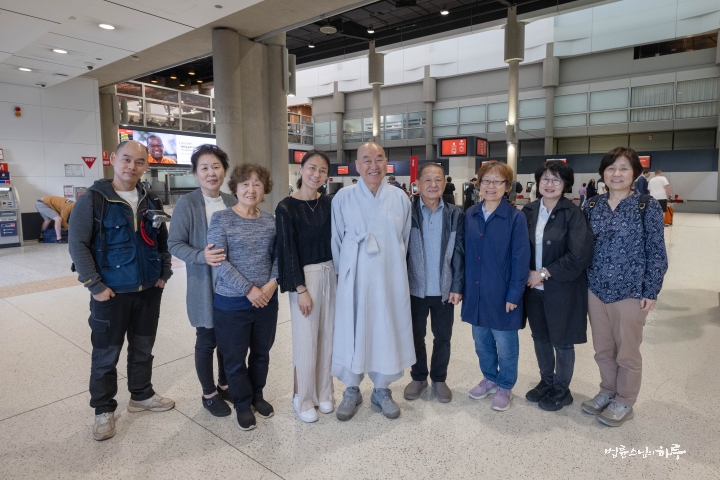
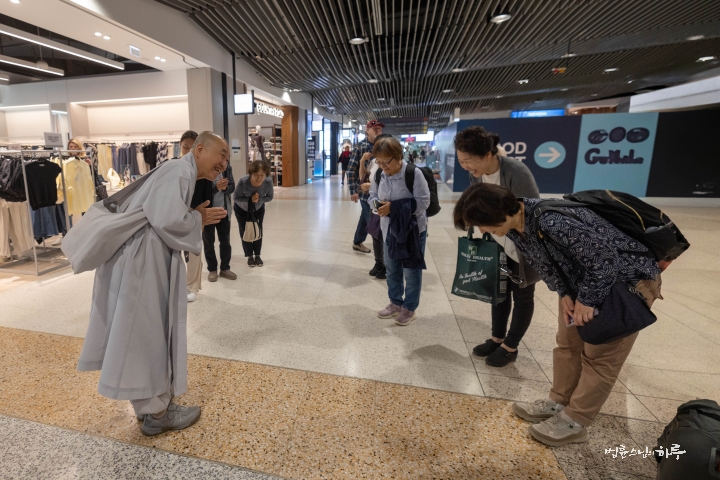
“Thanks to everyone’s best efforts, we successfully completed the lectures in Australia. I appreciate your hospitality. I’ll be heading to Timor-Leste and then to the U.S. West Coast.”
“Yes, Sunim. Please come back again next year.”
After saying goodbye, Sunim completed the departure procedures and headed to the boarding gate.
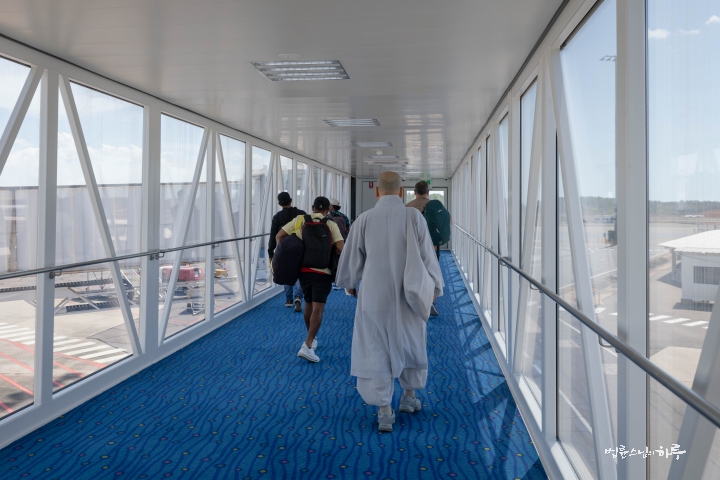
The plane that departed from Brisbane Airport at 9:05 AM arrived at Darwin Airport at 1:20 PM.
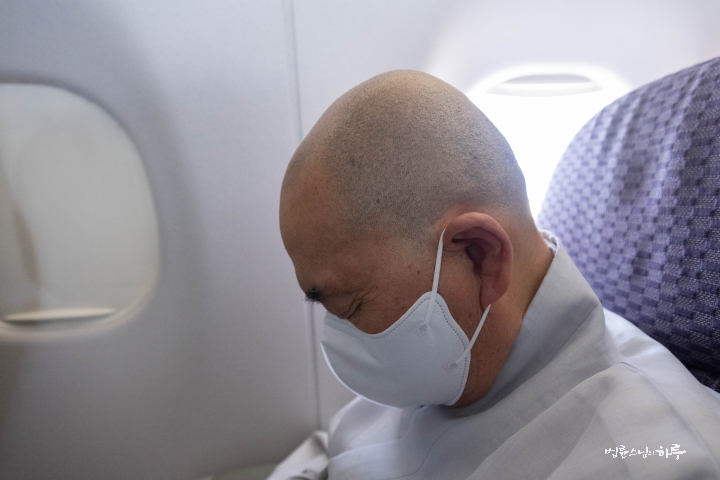
Sunim then boarded another plane bound for Dili, Timor-Leste. Soon, the island of Timor-Leste appeared beyond the jade-colored sea. After a 1 hour and 15 minute flight, the plane landed at Dili Airport at 3:10 PM local time.


Dili Airport was small and cozy. Although the temperature was hot, it wasn’t very humid as it was still the dry season.

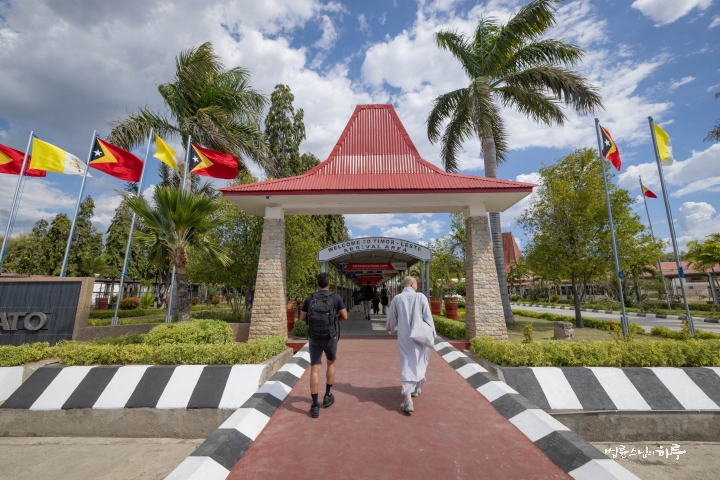
After receiving the arrival visa and exiting the airport, Ramon Magsaysay Award winner Eugenio Lemos warmly welcomed Sunim. Like a rural farmer, he greeted Sunim in a very comfortable manner.
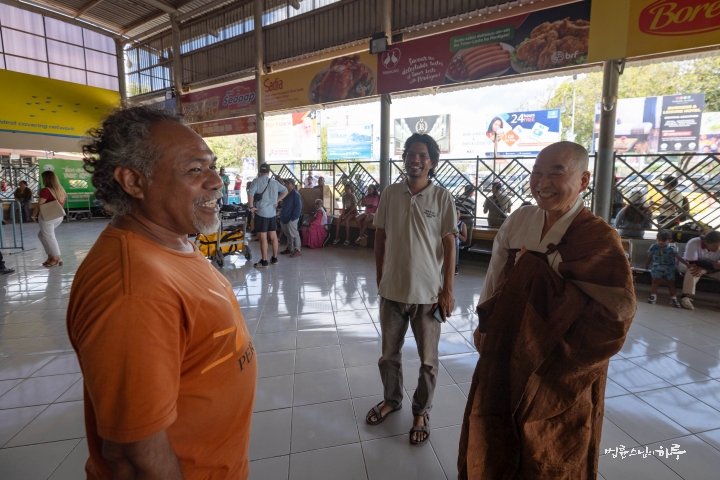
“Welcome to Timor-Leste”
Upon leaving the airport, Tasi Tolu Park in the capital Dili came into view. Yesterday, the Pope visited Timor-Leste, and about 600,000 people, nearly half of the total population, gathered in the park. Timor-Leste, where over 97% of the population are Catholic, has the second-highest proportion of Catholics in the world after Vatican City. Despite the large crowd, the event concluded safely without any major incidents.
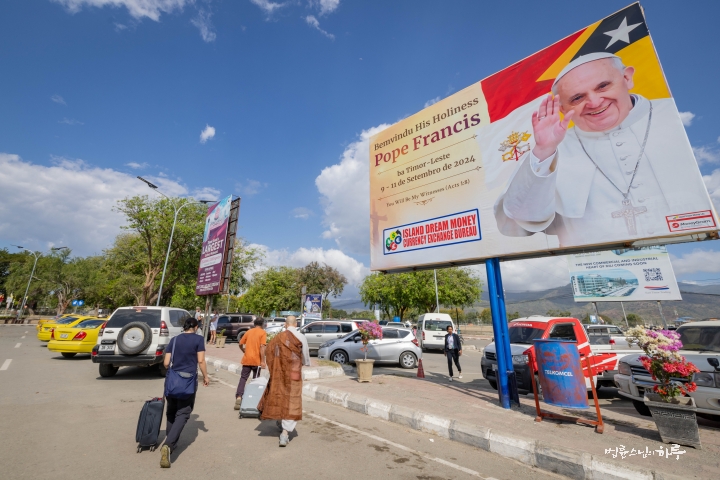
“I’m sorry if my visit has been a burden, as you must have been busy preparing for the event. When I made plans a few months ago, I had no idea the Pope would be coming.”
“Not at all. It was a coincidence, but I think it’s a really good connection.”
Lemos himself drove from the airport to the accommodation.
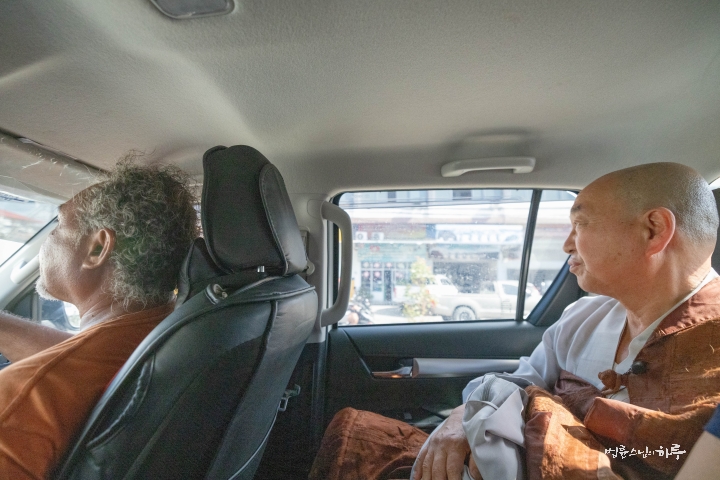
“You must be very tired from traveling long distances every day.”
“No, I’m fine. The plane is probably more tired than me.” (laughs)
While driving, Lemos briefly explained about the work that Permatil is doing in Timor-Leste.
“Timor-Leste is a mountainous region. It’s currently the dry season. Our organization, Permatil, has formed 700 communities across Timor-Leste. Mostly young people are involved. In October, we plan to hold a Permatil camp for youth nationwide. We’ll have learning and fun activities in water and resource management, agriculture, aquaculture, and agroforestry.”
Sunim also asked a few questions.
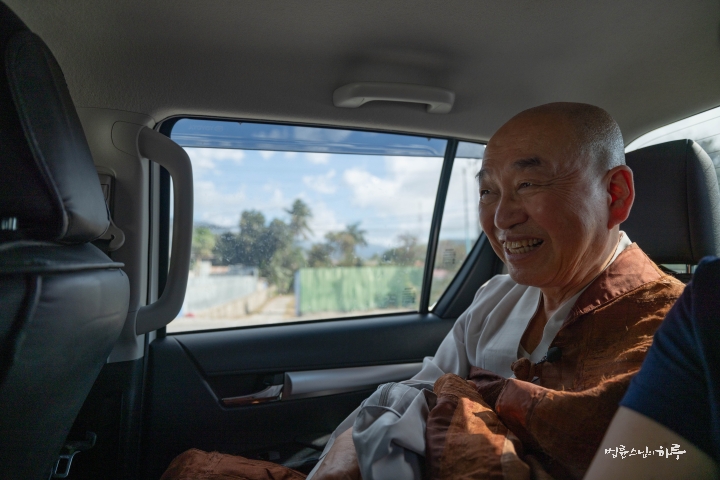
“Do many young people from Timor-Leste go to Australia to make money?”
“Yes, that’s right. It’s a major issue that the country is concerned about.”
“Before coming here, I visited Bhutan, and there too, young people have all gone to Australia to make money, so when you go to the countryside, there are only elderly people left.”
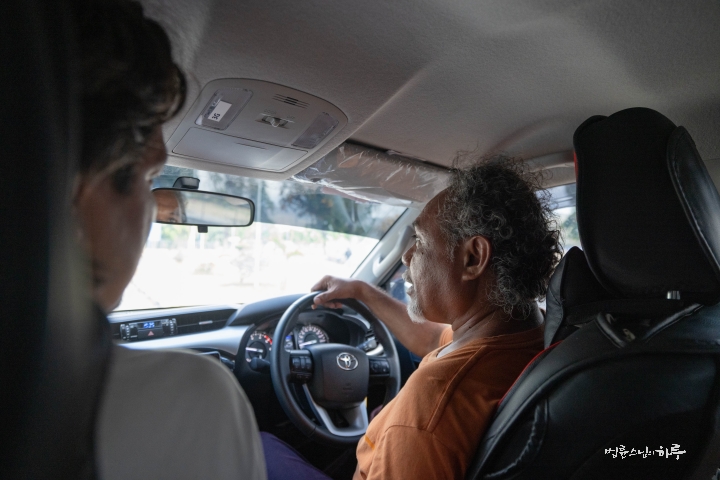
“Nevertheless, it’s fortunate that over 70% of Timor-Leste’s population is under 35 years old. That’s why we’re focusing our Permatil programs on young people. Permatil’s first project is water source restoration. We’re creating ponds everywhere to store water, recharge groundwater, and regenerate springs. The second project is creating school gardens. Students cultivate vegetable gardens and learn techniques like food waste management, natural pest control, and seed selection. This is being implemented in public elementary schools. We’re working on creating gardens in all schools to make them living learning spaces.
Many young people from Timor-Leste go to Europe and Australia to make money. As far as I know, over 2,000 are working in Korea. They mostly do labor jobs, working in factories or fishing on boats.
Water shortage is a major social problem in Timor-Leste. Women and children have to walk long distances or climb mountains to fetch water. That’s why Permatil is working to help villagers secure water resources. So far, we’ve restored 500 springs.”
“So you’re saying there’s a shortage of not just agricultural water, but also drinking water.”
“Yes, that’s right. Next October, we plan to hold a Permatil camp with youth from around the world. The theme is ‘Planting Water and Building Communities’.”
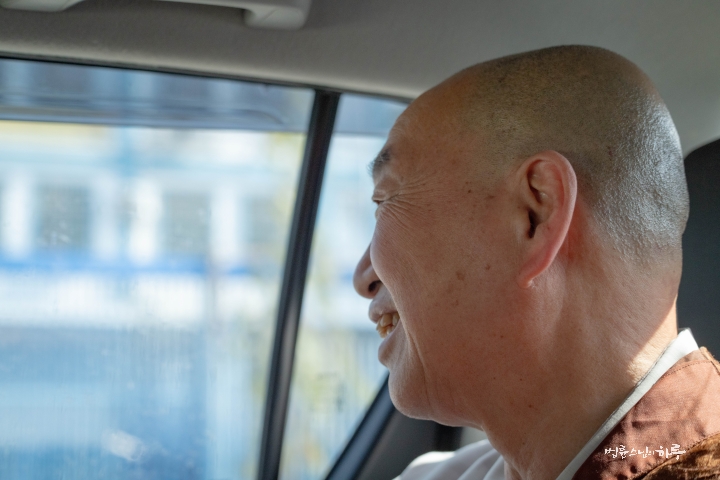
“While plains might lack water, why is there a water shortage in mountainous areas?”
“Although Timor-Leste is mountainous, residents have done a lot of deforestation, causing all the springs to dry up. Especially due to climate change, there’s less rainfall than before. As a result, springs have been gradually disappearing. The method I came up with is to dig into the mountains to trap water and collect as much rainwater as possible. We’re working to revive springs this way. Residents planted many water-absorbing trees, which actually degraded the soil. So we’re also running a campaign to plant many trees that retain water and improve the soil.”
As they conversed, they arrived at the accommodation.
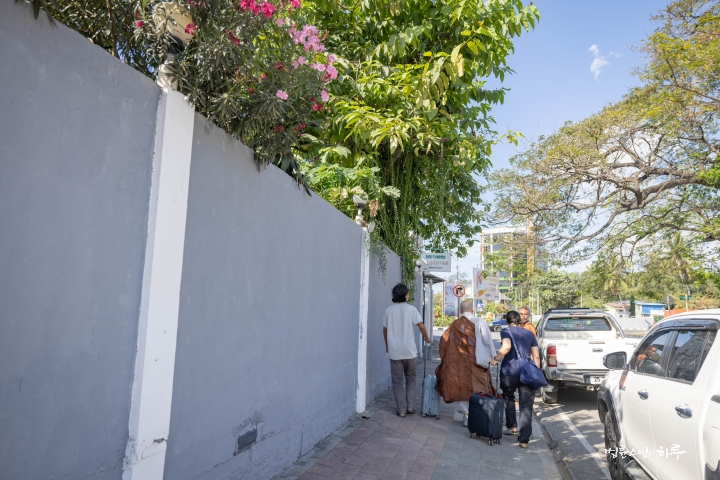
It was a small motel located near the Permatil office. Lemos guided Sunim to the accommodation.
Sunim talked about the topics he wanted to discuss during this visit.
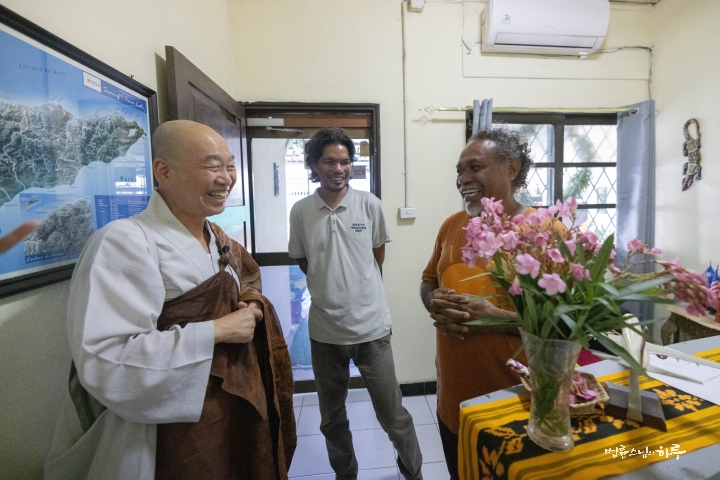
“There are two topics I’d like to discuss with you. First, how to preserve the environment in the era of climate crisis. Second, how to eradicate poverty. It seems we can have many conversations as you’re experimenting with both topics.”
“I’d also like to hear a lot about your wisdom on how to bring peace.”
After unpacking and settling in at the accommodation, they took some time to freshen up.
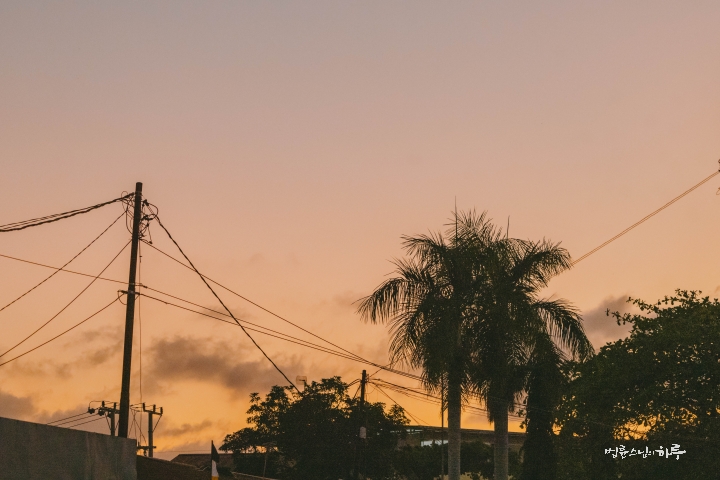
As the sun set, Lemos returned to the accommodation at 7 PM. Due to the aftermath of yesterday’s papal visit event, all nearby restaurants were closed. So they ordered a modest meal at the accommodation and had dinner together while conversing.
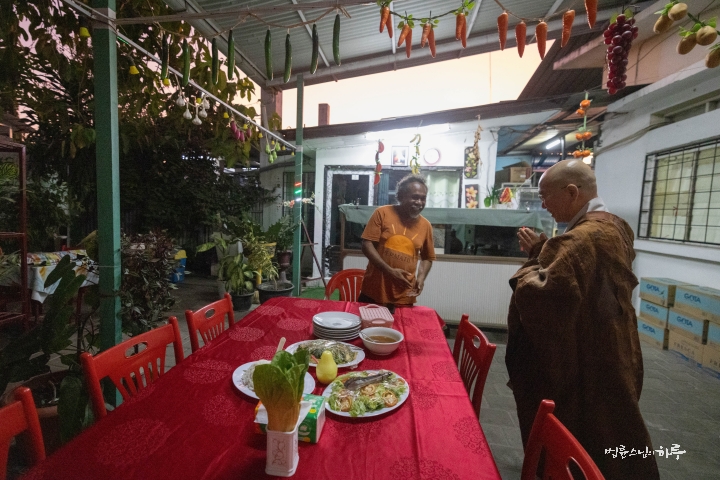
A Movement to Realize Environmental Conservation and Resident Self-Reliance Together
First, Sunim introduced the work he is currently doing.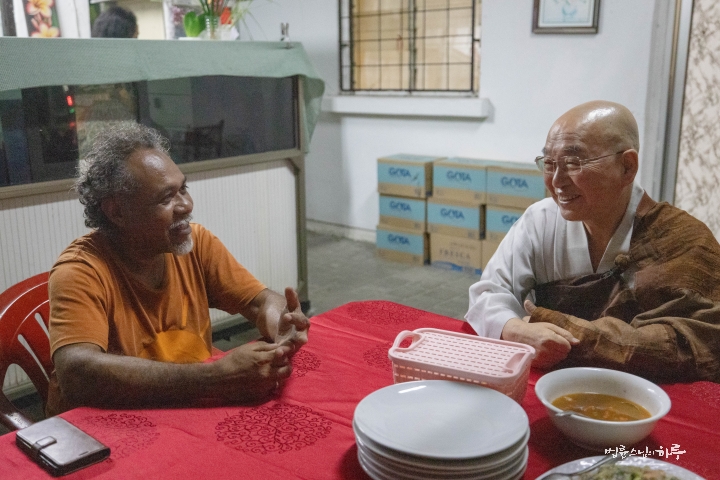
“We met at the Magsaysay Award ceremony last time, but I came here to hear the stories I couldn’t hear enough then. I’d like to listen to your’ activity plans and discuss if there are any areas where we can collaborate. If necessary, it’s possible to survey the entire East Timor. Currently, I am carrying out sustainable development in remote villages in Bhutan, living with minimal consumption as an alternative to overcome the climate crisis era.”
Lemos also introduced his work.
“My work involves reviving water sources in each village. I’m working with residents to revive water sources using natural methods. These activities are fundamentally aimed at preserving nature. First, we find out which families in the village are traditionally connected to the spring’s name, and then work with the villagers to revive the spring. I’ve seen many villagers happy. In particular, I focus on working with young people who have the drive to change their respective villages. I’m currently also working in the Ministry of Education, and we started a new curriculum for schools last week.”
Through their conversation, the two quickly began to find areas where they could collaborate. Sunim explained in detail the eight criteria for village development projects.
“The village development project I’m doing focuses on residents independently and proactively pioneering their own lives. In that process, if there are material shortcomings, we provide some support while working together with the residents.”
“I want to write down Sunim’s words exactly as they are.”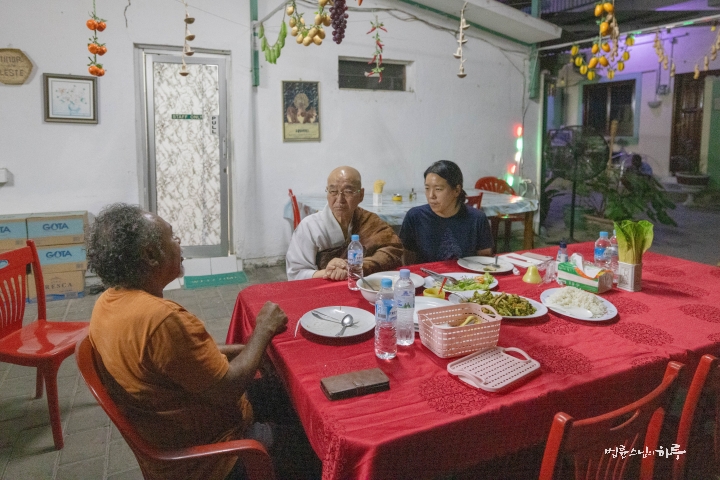
“This is already what Eugenio Lemos is doing. I came here because I felt a sense of empathy after hearing your presentation at the Magsaysay Award ceremony.”
“When you visit next time, I’ll prepare to show you more. I’d like to show you the schools where we’re creating vegetable gardens.”
“That’s a good idea. When I was young, we grew vegetables in school gardens and used the harvested crops for lunch. Now, schools don’t even let children clean, let alone tend to vegetable gardens. It might look like progress on the surface, but it fails to foster independence in children.”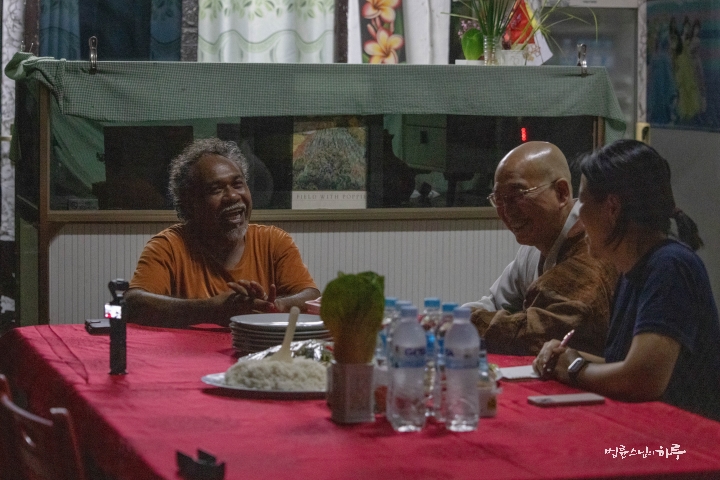
“When we started the school garden program in 2015, there was a lot of opposition. Parents opposed it, and teachers opposed it. As time passed and we integrated the garden into the comprehensive curriculum, those who opposed began to understand. As we incorporated the garden into teaching art or teaching geometry in mathematics, people who used to ask why we weren’t teaching started to change their minds. Currently, there are over 250 schools with gardens, but it took countless workshops to explain before we achieved these results. Now, we’re being invited from various places.”
“I’ll invite Lemos to Bhutan next time. It would be great if you could share your know-how with the people of Bhutan as well.”
Sunim shared what he learned while pioneering organic farming during the COVID-19 pandemic period.
The COVID-19 Pandemic That Made Us Realize the Importance of Food Self-Sufficiency
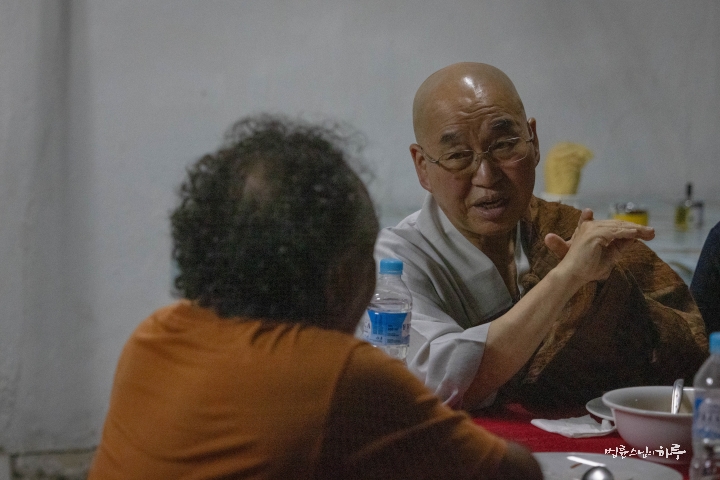
“The members living in the Jungto Society community spend two hours a day farming. No matter how busy we are, just as we take care of our meals, I believe we should cultivate our own food in nature, no matter how busy we are. Whatever one’s profession, even if one is the president, we should do two hours of farming in the morning before starting our main job, so that our thoughts don’t stray too far from nature. For this, every household should have a vegetable garden, schools should have vegetable gardens, and even the presidential palace should have a vegetable garden. Even if we can’t grow many crops, when we grow and eat at least minimal vegetables ourselves, humans can escape from excessive desires.
Farming is indeed hard work. During the recent COVID-19 pandemic, I stayed in without going out at all and spent time farming. When I did organic farming without using herbicides and pesticides, it was difficult because too many weeds grew.”
“It was the same for me and my family during COVID-19. While there were many negative aspects during COVID-19, there were also positive aspects, and we learned a lot. Living in the countryside, we couldn’t go to the city, but we were happy with the people around us, preserving water and farming.
Rather, people living in cities had a lot of difficulties, and those living outside the cities survived. This is because in cities where people don’t farm, it was difficult to get food when stores closed. I was lucky to live on the outskirts of the city, but my mother was in the city, so I often brought her food.”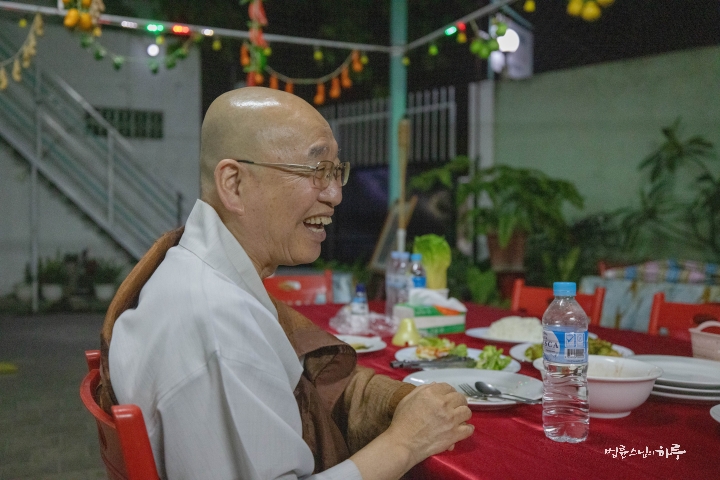
“What I learned from experiencing COVID-19 is that there’s nothing in this world that absolutely must be done. When things we had been doing continuously for a long time stopped due to COVID-19, I realized, ‘Ah, we don’t have to do this,’ ‘There’s nothing that absolutely must be done.’ So I stopped my usually busy daily life and went down to the countryside to farm for three years.”
Lemos shared about the life he has lived.
From the Pain of War and Hunger to Environmental Conservation Movement
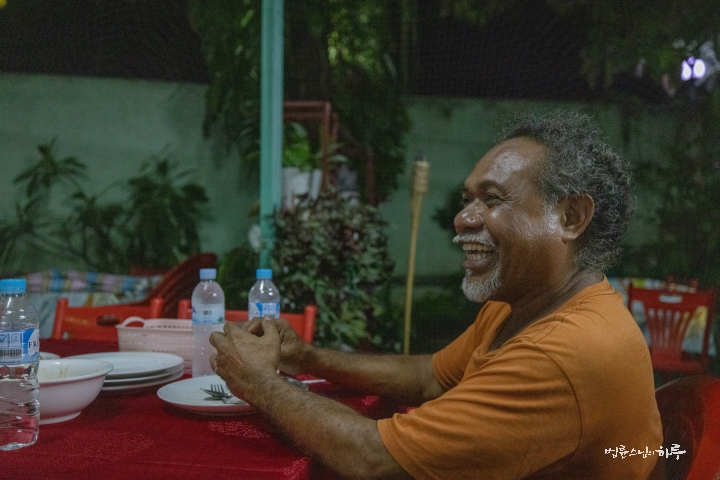
“To share a bit about my personal history, I was born as the second of four brothers in a mountainous region. My father worked as a carpenter and my mother did housework. My older brother passed away early, and when Indonesia invaded East Timor, my parents took me and my two younger siblings and fled to the high mountains. In 1976, my father was arrested, and I haven’t seen him since. My mother raised the three of us alone, and we moved around a lot. Moving from north to south, I learned a lot about how to live in nature. If you didn’t know how to live with nature, it was hard to survive. My younger sister and brother were too young to digest the food from the forest well, and they eventually died while we were on the run. So now only my mother and I have survived. My mother sent me to school while doing housework to help.
I learned a lot living in the jungle as a child. We lived eating anything that came from nature. There wasn’t even a separate place with a roof to rest. It was difficult to cook because if smoke rose, Indonesian soldiers would come and kill us. I saw many people die then. At that time, nature seemed like a big supermarket in my heart. If you discovered the principle of what and how to eat in nature, you could eat anything.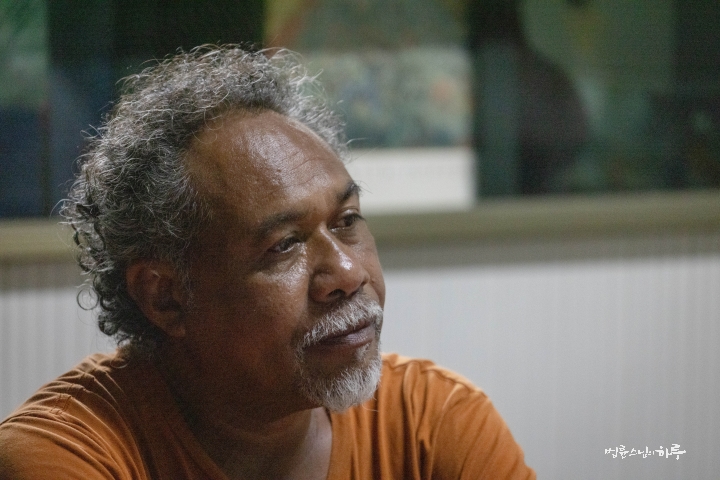
However, after coming to Dili, I saw nature being destroyed by people and it made me very sad. I want to dedicate myself to preserving the nature that helped me grow up. I want to share my story with the younger generation a lot. I compose songs myself and convey this sad story through songs. I’m especially motivating the younger generation through education.”
“It must be a painful memory for you, but that experience was a good learning that made you who you are today. For me too, the experience of living in nature in the countryside had the biggest influence in shaping who I am now. This is because when helping people in underdeveloped countries, my childhood experiences in nature are very helpful. Hearing about the environment where you grew up makes me understand the work you’re doing now better.”
Lemos requested that Sunim share many stories for the activists working at Permatil tomorrow.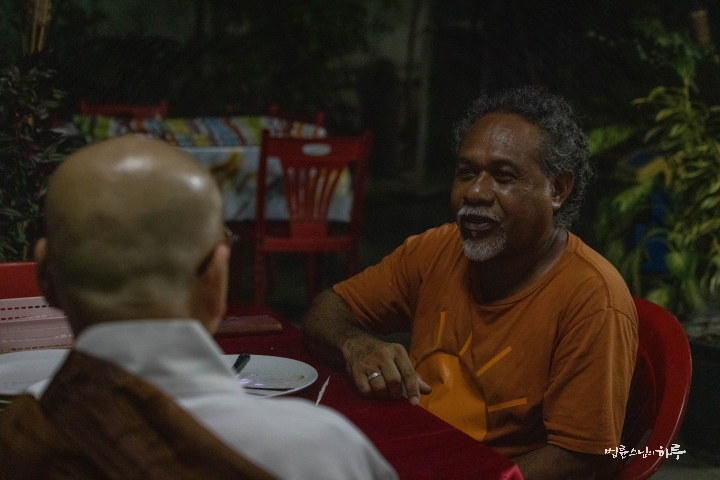
“Tomorrow, I’d like to hear Sunim’s stories along with our volunteers. I’ve already mentioned it, so everyone will be looking forward to your words. In particular, we’d like to hear about war and peace related to water. We want to hear Sunim’s wisdom about how water can bring peace and also bring war.”
Sunim briefly explained the importance of water and promised to continue tomorrow.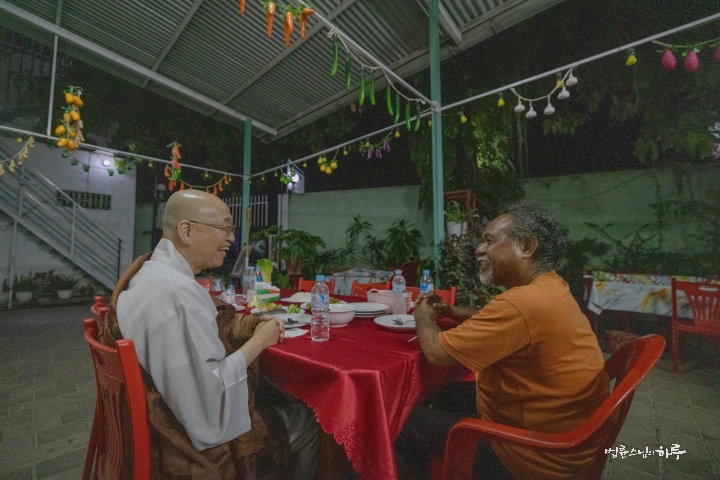
“If you go to the Indus River basin in Pakistan, you’ll see that areas that were once farmland have now turned into wastelands. This is because much of the Himalayan glaciers have melted away. As the water level in the rivers has dropped, the water level has become lower than the canals, causing the canals to fail to function properly. In Bangladesh, as the river water level has dropped, seawater is flowing back into the rivers, making it impossible to farm due to salinity. In this way, water is directly linked to life. While natural disasters like heavy rains or droughts cause significant damage, in the long term, changes in water due to the climate crisis will be a major threat to us.
In North Korea, due to the lack of firewood, there are no trees in the mountains, so even a little rain causes floods or they suffer greatly from drought. In a situation where agricultural production has decreased, trade blockades due to conflicts with the United States have led to severe food shortages, resulting in people continuing to starve to death.”
As they talked, it became 9 PM.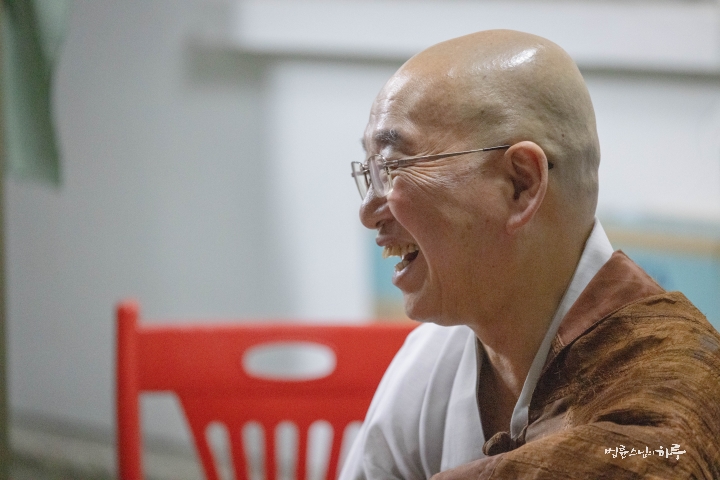
“Tomorrow, please just show us as much as you’ve prepared. Next time, I’ll set aside more time to look around carefully.”
“Sleep well. See you tomorrow.”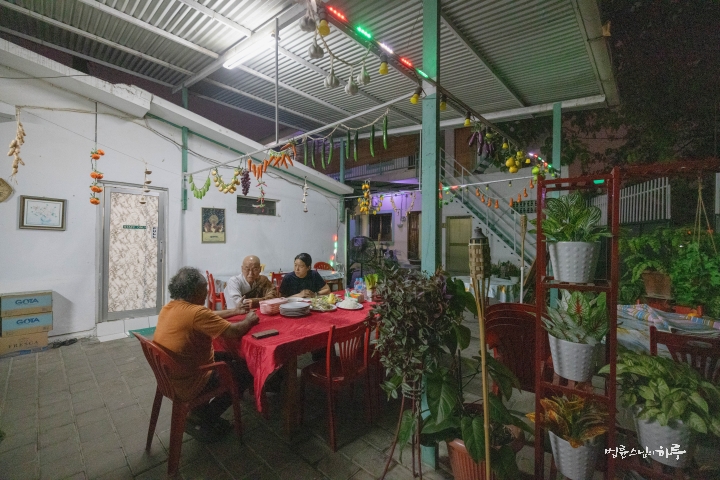
After briefly sharing about tomorrow’s schedule, the conversation ended.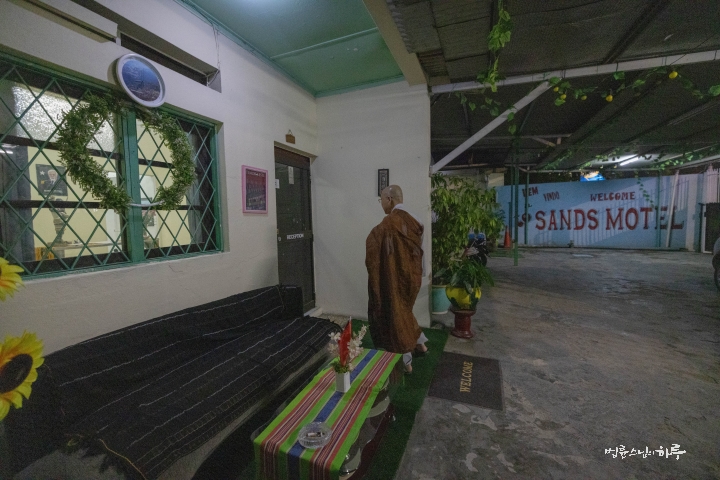
Tomorrow morning, Sunim will meet with Permaculture activists for a discussion. In the afternoon, he will visit a water restoration site, and in the evening, he plans to discuss future collaboration at the home of Ramos’ mother.
Since there was no Dharma talk today, we will conclude this post by sharing a conversation between a questioner and Sunim from yesterday’s Dharma Q&A session in Brisbane.
Overcoming Marital Conflicts in a Second Marriage: How Can I Find Happiness?
“While I’m not fully aware of the complexities of your situation, I don’t think the issue of not doing dishes is severe enough to warrant separation. Moreover, you don’t need to intervene when your husband nags his own children.
Your husband’s idea of having the 5 and 7-year-old children do the dishes is actually beneficial for their future. Learning to do dishes and clean rooms from a young age greatly helps with independence later in life. In fact, you should be doing this, but since you’re raising the children like pets, your husband is stepping in. Many people reach the conclusion that they can’t live together over such minor issues. So, if there are no major problems in the big picture, it’s better to let go of your own assertions and live accordingly.
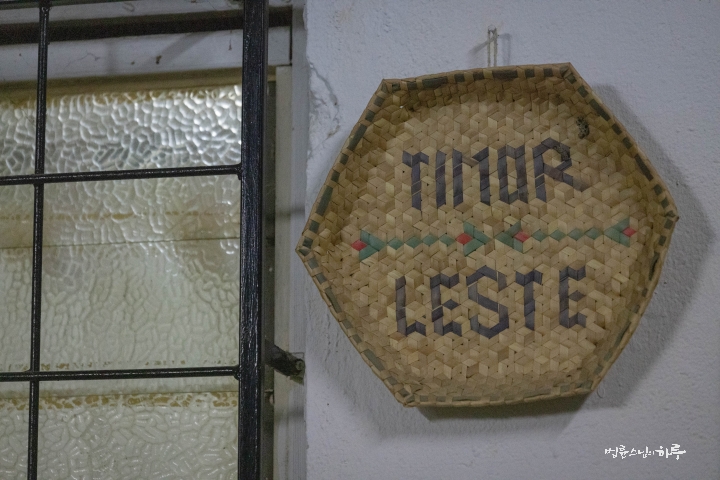
Compared to situations where a spouse loses all the household money in stocks or cryptocurrency, uses drugs, causes trouble while drunk every day, or has an affair, your husband’s issues aren’t that significant. Once you start focusing on the speck in someone else’s eye, there’s no end to it. That’s why Jesus said, ‘You see the speck in your neighbor’s eye, but do not notice the log in your own eye.’ Don’t exaggerate small issues as if they were logs. Don’t interfere when your husband scolds the children, just let them be, saying ‘You kids have fun playing together.’ You can simply think, ‘It doesn’t matter who does the dishes – whether it’s the older child, the younger one, or my husband. It has nothing to do with me.’ That’s all you need to do.”
“You’re right. But I’ve told my husband to use the dishwasher, yet he doesn’t use it and keeps nagging the children.”
“How does he nag? Does he nag the children to do the dishes?”
“Yes.”
“Your husband’s suggestion is actually very good for the environment. This is not a joke. In Jungto Society, we do dishes in three stages. We prepare three basins of water, scrape off any leftover food, wash in the first basin, rinse in the second, and do a final rinse in the third. This method can clean dishes for 100 people, while using a dishwasher consumes five times more water and requires more chemical detergents. I’m not saying your husband is right and you’re wrong, but from a different perspective, your husband’s view could be correct. While you might see your husband as the problem, he might think you’re wasting too much water. Your husband might be thinking, ‘She’s only pursuing convenience’ or ‘She’s trying to do everything herself instead of teaching the children to work.’ Ask your husband why he acts this way. There must be reasons. You’re getting caught up in your own thoughts and end up nagging your husband.”
“I’m not the one nagging, my husband nags me.”
“From your husband’s perspective, he might have reasons to nag. How does he nag? Let’s hear an example of his nagging that makes you feel like you can’t live with him anymore.”
“For example, he complains, ‘Why did the children leave their milk glasses in the sink?'”
“Well, if they used the glasses, they should put them away, not leave them in the sink. Your husband is right.” (Laughs)
“I see.”
“You say you understand, but inside, you’re probably thinking, ‘Why can’t he just clean up himself?’ I fully understand your position, but there’s no need to resist. You could simply say, ‘I’m sorry I didn’t notice and clean up.’ Then follow up with, ‘If I happen to leave things out, could you please clean up?’ Try accepting the other person’s point first, then make your request. You’ve lived together for 10 years, haven’t you figured out how to handle this yet? With two children, trying to change your husband again would be difficult.” (Laughs)
“You’re right. I just realized something while you were speaking. I’ve realized that it’s a wise choice to make good use of what I already have.”
“When I became a monk, it created conflict with my parents. They had raised me with such care in the countryside, and then I left for the monastery while still in high school. Imagine how heartbroken they must have been. It’s difficult to sever ties even with people we didn’t choose to be connected with, so I find it quite brave when people try to form new relationships after abandoning ones they chose themselves. If you made a choice, you should be prepared to accept the consequences. With children involved, separation isn’t a simple matter. How can you keep trying to run away after making a choice?
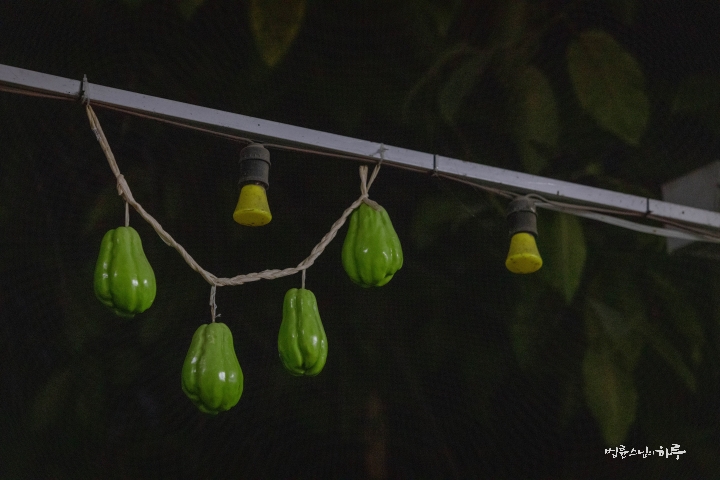
As we age, it becomes increasingly difficult to adjust to our spouses. Especially when living with a foreigner, the likelihood of separation in old age increases. This is because humans have a homing instinct – as we age, we tend to want to return to the environment of our youth. When young, there might have been no problem eating bread in a foreign land, but past sixty, you might start craving doenjang jjigae or kimchi. Conversely, your husband might revert to his childhood habits. While he might have enjoyed doenjang jjigae when young, in old age he might start complaining about the smell. Many Korean nurses who married foreigners in Germany talk about the difficulty of not being able to eat meals together in old age. They might cook doenjang jjigae because they crave it, but their husbands yell about the smell, forcing them to eat on the balcony. This leads to many divorces in old age. However, these issues can be overcome with mutual understanding. People keep dogs because dogs don’t nag. In fact, if you could just avoid nagging each other, there wouldn’t be major problems in living together.”
“Thank you.”




